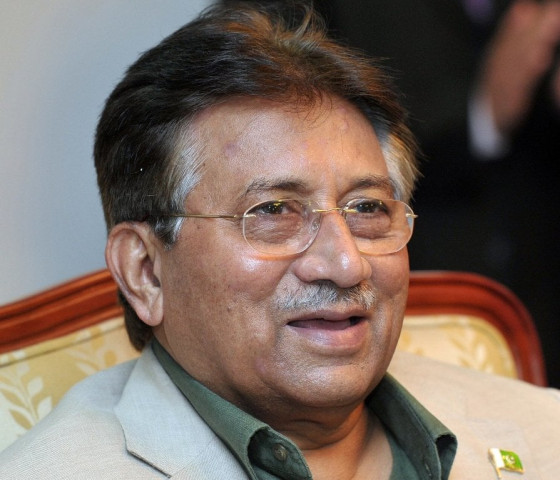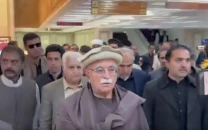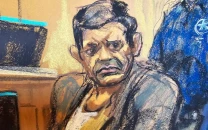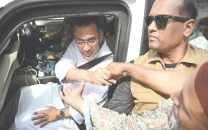Analysis: For Musharraf, 1973 document wasn’t the constitution
In his July 31 judgment review petition, he says assembly was incomplete after East Pakistan secession.

In his July 31 judgment review petition, he says assembly was incomplete
after East Pakistan secession.
The historic trial of former president Gen (retd) Pervez Musharraf has thrown up a number of puzzling constitutional questions – particularly given that this case is the first of its sort in Pakistan.
Among the questions are the arguments being posed by Musharraf’s legal team – and not only in the treason trial itself.
The basis of the treason trial, the Supreme Court’s historic ‘July 31’ (2009) verdict that held Musharraf guilty of unconstitutional acts, has been challenged by the former president and army chief – and his petition, which has been accepted for hearing, has a number of elaborate arguments.
In his review petition against the ‘July 31’ judgment, Musharraf’s legal team has actually challenged the authenticity of the 1973 Constitution that the former army chief is facing trial for abrogating, subverting and suspending.

The argument here is that the promulgation of the document that we know and treat as the Constitution is a mere act of parliament and nothing more. Ostensibly, the reason being given is that the 1973 Constitution was passed only by the West Pakistan Assembly – ie, what was left of the combined Constituent Assembly of East and West Pakistan elected originally in 1970. If one follows this argument, after these elections, the Eastern Wing, along with half the assembly, seceded to become Bangladesh in 1971, but the West Pakistan parliamentarians remained in place. And though they remained in place, the basis of their election was the 1970 polls – and based on that, they numbered only half of the assembly.
Moreover, Musharraf contends that a majority of the members of the constituent assembly did not participate in the framing of the interim constitution of 1972 and the present “1973 Constitution”.
Hence, it is argued, the document (what we regard as the constitution) is an act of parliament and its violation technically does not amount to high treason.
The one-judge bench, comprising Justice Anwar Zaheer Jamali, accepted Musharraf’s petition for hearing during an in-chamber proceeding earlier this week. However, Chief Justice Tassadaq Hussain Jilani – who was also part of the larger bench that rendered the July 31 judgment – will constitute a larger bench, not less than 14 judges, to hear the case (given that the original July 31 verdict was passed by a 14-member bench).
Musharraf’s review petition also states that the Supreme Court, in its binding short order, has not directed for his trial for a high-treason offence. And rightly so, he adds, because when the “Constitution” was held in abeyance in the past – first on July 5, 1977, by General Ziaul Haq and, the second time, on October 12, 1999, by the petitioner himself – the federal government did not initiate any trial for high treason at the time.
He further argues that the Supreme Court was fully aware of the fact that the present ‘Constitution’ was enforced by a constituent assembly elected under the regime of Yahya Khan, who, according to many, was also a ‘usurper’.
Musharraf also expressed his surprise over the high treason trial initiated against him, saying that before November 3, 2007, there had been five instances where ‘deviations’ (events when those in power deviated from the Constitution) took place that were validated by the courts and parliaments on grounds of necessity and security of Pakistan.
Similarly, argues Musharraf in his petition, the deviation of November 3, 2007 was also taken under the doctrine of necessity.
However, many parts of the argument in the review petition were incomprehensible – the language and grammar could not be understood. One such example is the following passage: “And even after passing 18th amendment when validate of proclamation of emergency and accorded by 17th amendment and also in Zafar Ali Shah case stood withdrawn and no case of high treason filed for October 12, 1999 events when even violate article 25 of constitution.”
Published in The Express Tribune, January 12th, 2014.



















COMMENTS
Comments are moderated and generally will be posted if they are on-topic and not abusive.
For more information, please see our Comments FAQ